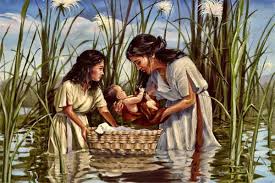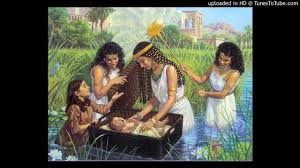The Mothers of Moses
Jochabed the Levite
Her name means: “The Lord Is Glory”
Her character: Her fierce love for her son, coupled with her faith, enabled her to act heroically in the midst of great oppression.
Her sorrow: To live in bondage as a slave.
Her joy: That God not only preserved the son she surrendered to him but that he restored her child to her.
Key Scriptures: Exodus 2:1-10, 6:20; Hebrews 11:23
Pharaoh’s Daughter
Her character: The Hebrew Israelite people honor men and women whom they designate as “righteous Gentiles.” These are people who, though nonbelievers, have assisted Yehovah God’s people in some significant way. Surely, Pharaoh’s daughter should top the list of righteous Gentiles, courageously and compassionately delivering a child from death, a child who would one day act as Israel’s great deliverer.
Her sorrow: That her adopted son, whom she had taken care of for forty years, had to flee his home in Egypt in order to escape Pharaoh’s wrath.
Key Scriptures: Exodus 2:1-10
Their Story
Three hundred years after the death of the patriarch Joseph, a baby boy was born in Egypt, his lusty cries muffled by a woman’s sobs. Jochebed’s heart was a tangle of joy and fear. This son, his fingers forming a tiny fist against her breast, was so striking a child she hardly believed he was hers. Tenderly she raised the small hand to her mouth, pressing its warmth to her lips. Her gesture calmed them both. She could feel the stiffness in her back dissolving, her muscles relaxing as she watched the night shadows evaporate in the morning’s light.
Slave though she was, she was yet a Levite, a woman who belonged to the God of Abraham and Sarah, of Isaac and Rebekah, of Jacob, Rachel, and Leah. She knew the stories. She believed the promises. Yehovah God was faithful. Hadn’t her people already grown as numerous as the sand of the sea, just as he said they would?
In fact, the Israelites were so numerous that the pharaohs feared they might one day welcome an invading army and betray the nation from within. Over time, the Egyptians had tightened their grip, finally enslaving the Israelites, until Pharaoh’s paranoia produced an even greater evil—a command to murder each Hebrew male child emerging from the womb. But the Hebrew midwives feared Yehovah God more than the king and refused to follow his orders, excusing themselves by claiming that Hebrew women were stronger than Egyptian women, giving birth before the midwives even arrived.
So Pharaoh commanded his soldiers to search out and smother every newborn male in the waters of the Nile. Jochebed could hear the screams of the mothers echoing regularly across the Hebrew camp as their children were torn from them. Her arms tightened around her own child as he slept quietly against her breast. This one, she vowed, would never be fodder for the Egyptian river god. She and her husband, Amram, would pray. They would plan. And they would trust Yehovah God to help them.
For three months, as long as she dared, she hid the infant, managing to keep Miriam his older sister and three-year-old Aaron quiet about their new baby brother. Finally, she acted on an idea that had been growing in her mind. Pharaoh had commanded her to consign her son to the Nile River. All right then. Her own hands would put him into the water. Remembering how Yehovah God had spared the child Isaac on the mountain of sacrifice, she bent down and laid her son in a basket of papyrus, waterproofed with tar and pitch. Then, with a whispered prayer and a last caress, she wiped her eyes, begging Yehovah God to preserve her baby from the creatures that swarmed the river.
She could not bear to watch as the child drifted away from her. Instead, young Miriam kept vigil, following at a distance to see what would become of him. Soon Pharaoh’s daughter arrived at the riverbank with some of her attendants. Spotting the basket among the reeds, she sent her slave girl to fetch it. As soon as she beheld the brown-eyed baby, she loved him. The river had brought her a child whom she would cherish as her own. She could not save all the innocent children, but she could spare one mother’s son.
Was she surprised when a young slave girl, Miriam, approached, asking whether she could go after a Hebrew woman to nurse the baby for her? Did she suspect the truth when Jochebed gathered the boy in her arms, this time as his nursemaid? Whatever was in her mind, Pharaoh’s daughter named the child Moses, saying, “I drew him out of the water.” For the next forty years, she educated him, a prince in the courts of Pharaoh himself.
Yehovah God kept Moses safe in the midst of extraordinary evil and danger—first in the infested waters of the Nile river and then when he was growing up right under Pharaoh’s nose. And he used the Egyptians to protect and educate him in ways that must have made Moses even more effective in his eventual role as his people’s deliverer. Year after year, Jochebed would surely have reflected on the marvelous faithfulness of Yehovah God. Her ingenuity, courage, and faith should inspire even the most weak-kneed among us. Two women—a Hebrew slave and a Egyptian princess—preserved the life of Israel’s future deliverer and so preserved the entire Hebrew Israelite people.
Their Promise
Moses’ mother, Jochebed, had one thing in mind when hiding her son and leaving him in a basket in the river. Her goal was to preserve his life for one more day, one more hour, one more moment. She could not have known how Yehovah God planned to work in her life or in the life of her son. Nor did she realize he was putting into place a divine plan to rescue his people from the very oppression she was resisting.
Yehovah God’s ways are beautiful in the extreme. He uses the devoted, intense love of a mother for her child to bring freedom to an entire people, the Hebrew Israelites. Like Jochebed, our goal should be to hang on, trusting that Yehovah God has his own purpose at work and that we and our children are part of it.



0 Comments